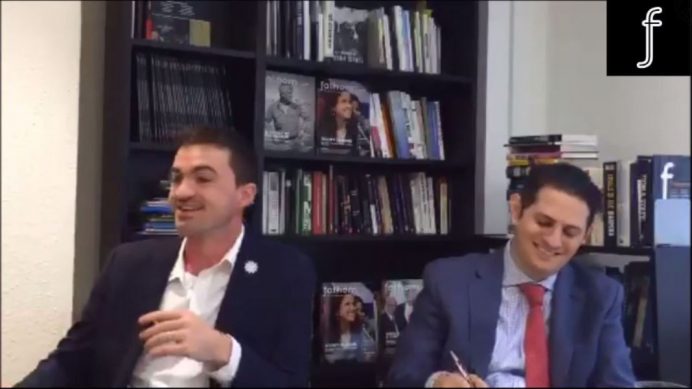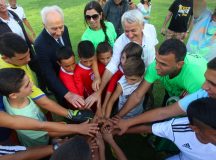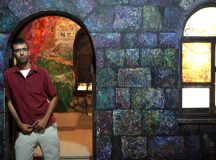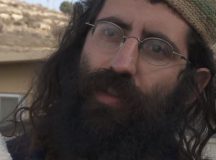‘The best people to convince Israelis that Palestinians are not monsters, and to show the Palestinians that Israelis are not monsters,’ wrote Joel Braunold in Fathom last year, ‘are the respective populations’. However, with current polling demonstrating that the youth of Israel are more right-wing and religious than any other cohort, and given comparable data in Palestine, the oft-repeated axiom that that the youth hold the key to resolving the conflict must be re-examined. Why do the young hold such divergent views from their parents? Can they be organised as agents of positive change, and if so how? Why are people-to-people peace projects so important? And how can the international community help to support those projects and scale them up? These questions were addressed by John Lyndon, executive director of OneVoice Europe and a visiting fellow at King’s College London and Joel Braunold, executive director of the Alliance for Middle East Peace and contributor to Haaretz and the Jerusalem Post in a recent Fathom Forum in London.
Joel Braunold: After President Shimon Peres’s funeral, Bill Clinton was flying back to the US and was giving a press conference to the gaggle of reporters who were with him and President Obama. When Clinton was asked about his hopes for peace, he said ‘peace will come when the youth of the region demand it’. The problem with that, and with the assumption of international policy-makers that, if we just wait, the youth of the region to rise up and demand change from their leadership, is that the polling tells us a very different story. It is important that policy-makers are aware of this, so they are not disappointed and so that they apply an appropriate strategy, based on the situation as it is, and not as they imagine it to be.
On 17 July this year the Rafi Smith Polling Institute, polled people on the two-state solution, and they found that among the 18 to 29 cohort, only 35 per cent supported a two-state solution. 53 per cent rejected it. I worked with Jeremy Sultan who is a member of HaBayit HaYehudi (Jewish Home Party), and is a prominent poll analyst in Israel. We started looking at other data streams to see if this was a trend, that the youth bracket in Israel was more sceptical than their elders. We found it was.
We looked at the Rafi Smith polling of 31 August 2016 and we found that 54 per cent of 18 to 24 year olds were fine with Haredi control over religious matters, compared to just 43 per cent of the over 50 year olds. We started going through the Pew Research Centre documents; the largest polling of Israeli Jewry ever done, with over 10,000 face to face interviews over three years. The age brackets they looked at were the 50-plus, and the 18 to 49 year olds. When looking at the latter, we found that on the issue of settlement expansion, or Halakha (the collective body of Jewish religious laws derived from the Written and Oral Torah) being a source of implements and state law, or Israel being God-given, or the expulsion of Arabs from the land – in each case support among the 18 to 49 year old bracket was higher than it was in the 50-plus bracket.
We also looked at polls from 2015 and found that among 18 to 29 year olds, 57 per cent supported Benjamin Netanyahu as Prime Minister, and only 19 per cent supported Isaac Herzog, but when we looked at all the older age cohorts, we found that they were more supportive of Herzog. A poll from 2013 showed that 67 per cent of HaBayit HaYehudi (Jewish Home) supporters were under the age of 50, and only 32 per cent were over 50. And when we looked at the statistics from the Central Bureau of Statistics, we found that self-defined ‘secular’ Israelis make up 52 per cent of the 50-plus cohort, but only 44 per cent of the 18 to 29 year old cohort.
What we think we are finding, and Jeremy and I wrote this up for the Jerusalem Post, is that the younger cohort is more right-wing and religious for two reasons. The first is demographic. 28 per cent of all ultra-orthodox Jews in Israel over the age of 40 have had seven or more children. Second, we are seeing shifts in learned experience. What does that mean? If you are currently 30 or below, in Israel, you have experienced in your formative years a lowered political horizon when it comes to peace and reconciliation with the Palestinians. Your formative years were the Second Intifada. And you grew up with Prime Minister Netanyahu, who, I would argue, hasn’t really been a positive influence on prospects for a two-state solution, at least in the public discourse. And so their political horizon has been squashed.
Why am I, as the executive director of the Alliance for Middle East Peace (ALLMEP) writing about this, making it into a big thing? There are two reasons.
First, we people-to-people activists are not pollyannaish. Many people assume that we are unable to understand the realities. Not so. We have to be aware of the real situation as it presents itself, not the situation we imagine, to be effective.
Second, we are seeing shifts on the ground in the nature and delivery of people-to-people programmes, informed by new theories of change-making and led by new voices in the Israeli peace camp. Instead of concentrating on secular Ashkenazim, who have been the traditional base of the Labour and peace camps, a far wider and more open conversation is starting up, involving the ultra-orthodox, Mizrachim and even settlers. We saw that two weeks ago with Woman Wage Peace, who brought 20,000 women from across the political spectrum to Jerusalem. Shaharit and other programmes are trying to expand the conversation. Also, there are new kinds of change-makers emerging; new credible voices. Look at the new Mizrachi-heritage head of Peace Now, Avi Buskila.
Moreover, we are seeing moves to institutionalise the Left in a way that the Right did after 1993. More peoples are saying ‘we need to build institutions which will have the same influence as the Yesha Council has had – the Settlers Council.’
John Lyndon: Four times as many Israelis in their twenties support the annexation of the West Bank and the refusal to give citizenship to Palestinians as is the case with Israelis who are over 50. That is a huge gap, and it is ideological and well-embedded. Similarly, in Israel, 73 per cent of people over 50 think that Yigal Amir, the unrepentant murderer of Yitzchak Rabin, should spend the rest of his life in prison, which seems pretty axiomatic. But only 43 per cent of people in their twenties agree with that, which is a huge difference.
With regards to Palestinian society, there isn’t necessarily the same radicalisation on big national issues, but there is a really troubling attitude towards violence. 73 per cent of citizens between 18 and 22 support the legitimacy of stabbing civilians. And that stat is from February 2016, when more stabbings were taking place. 70 per cent of the same cohort believes that an intifada is a more effective mechanism of achieving national rights than negotiations. What we see when it comes to their attitude to violence is a pretty solid 10 per cent gap between people aged 50 and above, and those in their late teens and twenties. On the other hand, what we also see are more well-developed ideas about civics among younger Palestinians,. When it comes to their ideas about civics, democracy, and the rule of law, Palestinians are in a better place than many other Arab citizens in the region.
Demographics are important. In Israel, you have a median age of 29, which is significantly younger than most of the Organisation for Economic Co-operation and Development (OECD). In the West Bank it is 20, which is very young for the world, and young even for the Arab world. In Gaza it is 16, which I think is the third or fourth youngest in the entire planet. (And that’s exactly the same median age as the ultra-orthodox in Israel.)
Try to imagine the lived experience of those people. If you take the median Israeli, they were eight when Rabin and Arafat were shaking hands outside the White House, at the last unambiguously positive moment in this conflict, and 10 when the Prime Minister was killed. That was a huge turning point. At 15, the Second Intifada broke out and they were afraid of walking past a bus, never mind getting on one. Psychologically, this is a big thing to carry with you at such an impressionable age. When you are 17 the separation barrier goes up, and that tiny amount of contact you had with Palestinians evaporates. A year later you went to the army, maybe you were a conscript in the West Bank serving among Palestinians during some of the most violent times we’ve had in the last 30 or 40 years. And for the period after that you experienced a war every couple of years with Gaza, so you spend time in bomb shelters. Recently, you were told by your Prime Minister that you are going to live by the sword forever.
Unfortunately, it is even worse for Palestinians in the West Bank and Gaza. For the West Bank, the median Palestinian was born after Oslo, after the assassination of Rabin, after the Hebron massacre. The Prime Minister when they were born was Netanyahu. They were four when the intifada began, so would have spent a lot of their formative years with Israeli tanks and soldiers on the streets, possibly raiding their houses. It is very likely that they know someone who lost their life. There were 220,000 settlers when they started school, but there’s more than double that number now. By the time they graduated, unemployment had spiked. More: they’ve only seen one election in their life, and they’ve never seen a peaceful transition of power between leaders.
For a Gazan, when you were born there was an international airport in the Gaza Strip as well as a five-star beach resort and growing GDP built on an export economy. Within a year of your birth all of that began to go away, because of the Second Intifada. When you were seven, there was a bloody civil war in which Hamas seized power. The following year you experienced Operation Cast Lead: absolutely unprecedented violence, very high-tech weapons of war being used in a very confined space, as well as rockets being fired on civilians inside Israel. That was repeated again in 2012, and again in 2014, when, at the age of 14, you go through the worst war of all, the longest one. The Strip is destroyed and your reality is dystopian; you live with drones buzzing overhead, you have criminal theocratic gangsters running your life, you have the highest youth unemployment of anywhere in the world. And all this is all you’ve ever known. Oh, and you have never met a Jew or an Israeli.
We shouldn’t shirk these realities. These are traumatised people who have lived through terrible experiences and they blame it almost exclusively on the other. But we have dealt with this in Northern Ireland and there are ways to grapple with this.
There are two things that we need to do. First, recognise that things were once very different. Nabil Shaath, the former foreign minister of the Palestinian Liberation Organisation (PLO), once told me that he worked in 1994 on a project that ‘exchanged’ Israelis from the southern towns around Gaza and Palestinians from Gaza. Israeli mothers and fathers from some pretty right-wing places – Ashdod, Ashkelon, Sderot – waved off their kids with no chaperones to enter the Gaza Strip and spend the weekend there. Palestinian parents did the same. It is incredible that such a reality existed only 20 years ago.
We need to support initiatives like the International Fund for Israel-Palestinian Peace that are taking a long-term approach to the question of how to recreate those conditions because, whether you believe in one state or two states, the attitudes that Israelis and Palestinians have towards one another is a time bomb. Even if we can produce partition, it is scary that so many people have these attitudes.
And there is a more urgent imperative. Two-thirds of Israelis that voted in the last election for the first time self-identified as being ‘right-wing’. As each cohort enters the Israeli electorate, we may have a more ‘right-wing’ electorate. Now, there is a battle going on within the right-wing: partition versus maximalism. It is incredibly important that a coalition is built inside Israel around the principle of a two-state solution. You see, the reality inside Israel is that most Israeli Jews don’t want to live in a state with Palestinians. They want to have self-determination in their own territorial unit. So even if Israelis don’t want a two-state solution, and younger people don’t support it as much as older people, as Joel rightly said, equally they fervently don’t want to live in a bi-national state. I am afraid the logic is that they need to choose one, and it seems to be that partition is the least objectionable to them.
Our partners in Israel Darkenu are doing incredible work to build a coalition [for two states] in Israeli society, using very interesting campaigning methods. There was a study done in Berkeley a couple years ago about what was the most effective way to change really hard-wired opinions. They found that the only method that delivers measurable change is a face-to-face conversation with another human being in which a personal story is shared that provides insight. Billboards don’t work, radio doesn’t work, Facebook doesn’t work. All the things the Left have been doing don’t work.
So Darkenu activists go door to door all over Israel and talk. About 70 per cent of the time, to places where the right-wing tend to win elections – parts of the Negev in the south, places along the Gaza envelope, also in the Galil. The activists have face to face conversations with Israelis and, though it is incredibly tough, they are signing up around 1400 people a week. Many of these people aren’t ‘peacemakers’; they are probably still going to vote for the centre-right. But maybe they will now be more likely to prioritise a two-state solution to the conflict. In the last election the two-state solution was only the seventh most important priority, which might sound incredible to a UK audience. If we can push that up the list of priorities, we can force the leaders on the political right to address it, and to come together with programmes and policies. And if the need for a solution can be expressed urgently by people from non-traditional leftist positions, using non-traditional leftist language as well, using very Zionist, passionate, nationalistic language, then maybe we will see a change.
Similarly, our colleagues in Zimam, the Palestinian partner of One Voice, have been working on the single-biggest problem that the youngest cohort is most angry about: disunity within Palestinian life. Yes, they want jobs, a better future, and opportunity. But what really frustrates many of my young Palestinian friends is the fact that – when I had a conversation with my Palestinian friend last week from Nablus, he said this to me – ‘even if Gandhi was the Prime Minister of Israel it wouldn’t matter, we have to get our house in order, we have to unite and have a single political entity’. So Zimam are also using petitions – not door to door, because it is not culturally appropriate in Palestine – and have collected over 10,000 signatures for a petition that sets out what kind of state Palestine should be. Many young Palestinians have progressive values and this petition talks about having a secular state – a place where pluralism is embraced, where violence is rejected. It has been signed by the Grand Mufti of Jerusalem, and some other senior Islamic clerics, as well as secular politicians within the Palestinian Authority (PA). Zimam will be launching the petition next month at the big event in Ramallah.
What we need to do internationally is try to create the conditions to help Israelis and Palestinians, not seek to substitute for them. So we need to support the initiative to create an international fund to support reconciliation, and by argue against those people who oppose people-to-people work and who shamefully try to delegitimise the Israeli and Palestinian peacemakers.
The International Fund for Israeli-Palestinian Peace
Alan Johnson: Joel, can you tell us about the International Fund? What is it and why it is so important?
JB: Sure. ALLMEP are working with a bi-partisan US Congressional coalition to create an International Fund for Israeli-Palestinian Peace. The problem is this: if we analyse all the streams of income coming into peace and reconciliation, we estimate it at around $45m (approx. £37m) a year. $10m (£8.4m) is USAID, $5m (£4.1m) is the EU, and around $30m (£24.7m) is Jewish philanthropy. The UK gives only £135,000 a year for this sort of work. If there are 12 million Israelis and Palestinians we are roughly spending $4 (£3.29) per person per year. In comparison, in Northern Ireland, after the Anglo-Irish Agreement, the International Fund for Ireland, which US President Ronald Reagan and House Speaker Tip O’Neill helped endow, spent around a $1bn (£823m) between 1986 to 2010 in capacity building, the creation of shared spaces – by the way if you have ever tried to bring large amounts of Israelis and Palestinians together you will know that there are very few places that can hold them – and reconciliation. What was really important about the International Fund for Ireland was that it guaranteed long-term scalable financing. It wasn’t tied to the highs and lows of negotiation. By contrast, what we have for the Israeli-Palestinian conflict is episodic funding. After the 2013-4 Kerry negotiations, the US State Department told us they didn’t really have the budget to do civil society work, because they were completely focused on the economic initiative.
We need that same level of strategic thought they had when solving the Irish conflict. We will try and create a $200m (£164m) a year fund which would make available around $16 (£13) per person. (In Northern Ireland, the figure was around $33 a person.) A quarter is to come from Congress, a quarter from EU member states, a quarter from the rest of the international community, including some Arab states, and a quarter from the private sector. As well as the good this money would do in terms of scaling up already world-class programmes, it would also help to build the Arab Peace Initiative, because it enables Arab states to actually do something positive without doing it formally with Israel. We can create an investment vehicle for peace, and is something that could be attractive for the Arab states. We have been busy. We already passed legislation in Congress. Labour Friends of Israel launched the Initiative in the UK parliament yesterday. I’m going to Canada in three weeks to really push it with the new Justin Trudeau government. We will push the initiative with either a Democratic or Republican president. And I am off to Paris this afternoon to talk to the French Foreign Ministry.




































